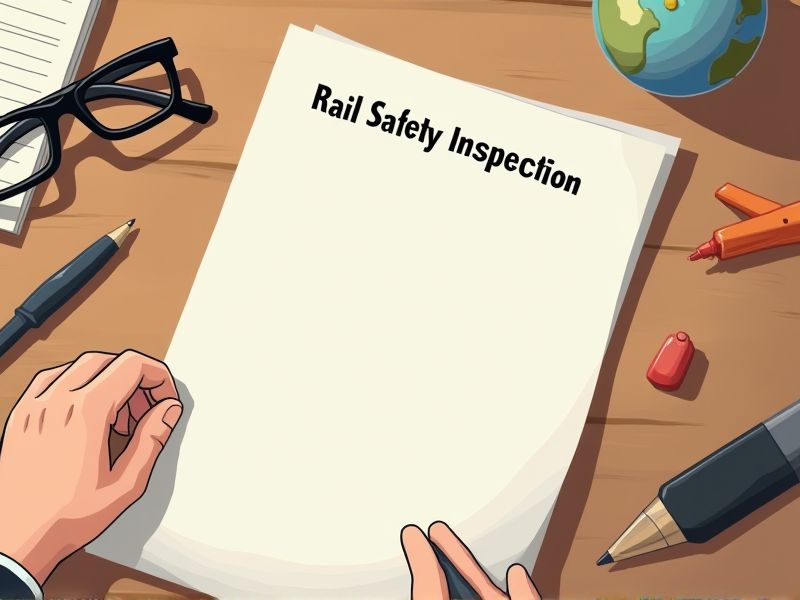
Rail Safety Inspectors play a critical role in ensuring the safe and efficient operation of rail systems, which means they must possess a deep understanding of industry standards and protocols. Certification in areas such as track safety, hazardous materials handling, and mechanical systems is essential to validate their competence and knowledge. Without these certifications, inspectors might lack the necessary expertise to identify potential safety hazards and enforce compliance with regulatory requirements. Key certifications that prospective Rail Safety Inspectors may need include these domain-specific credentials.
Rail Safety Inspector Certification
Obtaining Rail Safety Inspector Certification ensures inspectors possess the required knowledge and skills to assess and enhance railway safety standards effectively. Certification helps maintain industry-wide regulatory compliance, reducing the likelihood of accidents or infrastructure failures. Standardized training for certified inspectors contributes to a unified approach in identifying potential hazards and implementing preventive measures. Certifications also establish credibility and trust, reassuring rail companies and the public about the professionalism and competence of safety personnel.
FRA Rail Safety Compliance Certification
The FRA Rail Safety Compliance Certification is necessary to ensure rail safety inspectors possess the requisite knowledge to assess and enforce federal regulations. Without certification, inspectors might lack the standardized training needed to identify safety hazards effectively. Ensuring each inspector is certified helps reduce the risk of rail-related accidents by promoting consistency and reliability in safety assessments. The certification process creates accountability and trust in the inspectors' ability to uphold rail safety standards.
Certified Safety Professional (CSP)
A Certified Safety Professional (CSP) provides essential knowledge and expertise in risk assessment, crucial for identifying potential hazards in the rail industry. Enhanced safety protocols and compliance with regulatory standards are achieved through the strategic insights offered by a CSP. Comprehensive understanding of safety management systems leads to more effective incident prevention and response strategies. Elevated industry standards and credibility enhance public confidence in the safety measures implemented by CSP-trained rail safety inspectors.
OSHA 30-Hour General Industry Training
Inadequate safety knowledge among Rail Safety Inspectors can lead to preventable accidents and injuries, which have financial and operational consequences. OSHA 30-Hour General Industry Training provides comprehensive education on hazard recognition and mitigation, crucial for maintaining safety standards in rail environments. The training ensures inspectors understand complex industrial safety protocols, reducing the risk of non-compliance penalties. Enhanced safety competency from this training supports proactive safety management, contributing to safer rail operations.
Hazardous Materials Transportation Certification
Hazardous Materials Transportation Certification is essential for a Rail Safety Inspector because it ensures they are knowledgeable about the various types of hazardous materials and associated risks. This certification equips inspectors with the skills to assess compliance with federal regulations, thereby minimizing the likelihood of accidents. Understanding the proper handling and transportation methods for hazardous materials helps in preventing potential leaks or spills. Rail Safety Inspectors can effectively identify and mitigate safety hazards, enhancing overall rail safety.
Emergency Response & First Aid Certification
Rail Safety Inspectors encounter situations where quick response is crucial due to the high-risk environment. Possessing Emergency Response & First Aid Certification equips them with the skills to handle medical emergencies effectively. In the event of an accident, this training ensures immediate care, potentially reducing the severity of injuries. Certification also instills confidence in inspectors, enhancing their ability to manage emergencies efficiently and safely.
Accident Investigation and Root Cause Analysis Certification
Accident Investigation and Root Cause Analysis Certification equips Rail Safety Inspectors with the necessary skills to systematically identify factors leading to accidents. By understanding root causes, inspectors can propose effective preventive measures, reducing future incidents. Thorough certification ensures inspectors utilize a standardized approach, promoting consistency in investigations across the rail industry. The certification also enhances an inspector's credibility, fostering trust and cooperation from the workforce during investigations.
Environmental Health and Safety (EHS) Certification
EHS certification equips rail safety inspectors with essential knowledge of regulations and best practices, which directly correlates to reduced risk of accidents and injuries. Compliance with EHS standards promotes safe working environments that are crucial in complex, high-risk rail systems. Certified inspectors often demonstrate higher awareness and proactive management of potential hazards, leading to improved operational efficiency. Rail safety inspection teams with EHS certification are typically more trusted, potentially reducing liabilities and enhancing community confidence in rail safety.
Risk Management Professional (RMP) Certification
The RMP Certification equips rail safety inspectors with advanced risk assessment skills, crucial in identifying potential hazards and mitigating them effectively. This certification provides inspectors with a structured approach to risk management, enhancing their decision-making capabilities in critical situations. With growing rail networks and technology integration, an RMP-certification ensures inspectors are up-to-date with best practices, reducing accident rates and improving public safety. The certification validates their expertise, increasing credibility and trust among stakeholders and regulatory bodies.
Industrial Safety Management Certification
Rail Safety Inspectors require Industrial Safety Management Certification due to the high-risk environment inherent in the rail industry. Certification equips inspectors with essential knowledge to identify potential hazards and implement preventive measures. Regulatory compliance and standards mandate comprehensive safety training, which is effectively covered through certification programs. Proper certification enhances the inspector's ability to ensure a safe operating environment, reducing the likelihood of accidents and improving overall rail safety.
Summary
When you, as a Rail Safety Inspector, obtain additional certifications, you enhance your expertise in identifying and mitigating potential hazards. This increased knowledge allows you to implement more effective safety protocols, directly contributing to reduced accident rates. By elevating your qualifications, you also position yourself for career advancement opportunities within the industry. Organizations may experience improved compliance with safety regulations, minimizing legal liabilities and associated costs.
